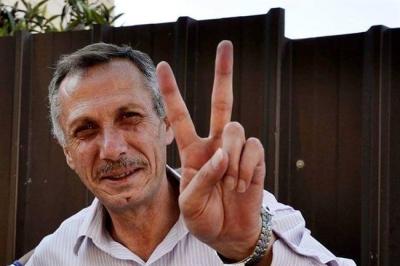
Hebron non-violent activist dies in tear-gas

Dr. Hashem al-Azzeh, who died on Oct. 21 after suffering excessive tear-gas inhalation in Hebron's Old City, was the latest victim of the Israeli settlement policies he spent most of his life struggling against. The 54-year-old activist and medical doctor was one of a few Palestinians who chose to remain with his family in Tel Rumeida, a neighborhood in central Hebron that over the course of decades has seen most of its Palestinian residents pushed out by aggressive Israeli settlers. After experiencing chest pains in his home, he found himself trapped. His family called an ambulance, but it was unable to reach him due to a series of Israeli army checkpoints along the nearby Shuhada Street, his niece Sundus al-Azzeh told Ma’an News Agency. Hashem began to walk toward the checkpoint at Bab al-Zawiya, where fierce clashes were underway as Palestinians protested the shooting of a Palestinian teen-ager [near Nablus] the night before. Once there, however, Sundus said that Israeli soldiers stopped him from moving on, and he soon found himself engulfed by tear gas. Unable to breath, he collapsed. He was rushed to Hebron's governmental hospital, but doctors were unable to save him. A doctor told Ma'an that Hashem had a history of cardiovascular disease, but it was tear-gas inhalation that killed him. Sundus said she was at his side when he passed away -- it was the first time she had seen someone die.
Palestinians' freedom of movement in Tel Rumeida was severely restricted in 1994, after an American-born Israeli settler, Baruch Goldstein, massacred 29 Palestinians in the Old City's Ibrahimi Mosque. While most Palestinians chose to leave the neighborhood, Hashem chose to remain, even refusing an Israeli offer to buy his home. "He wanted to face the settlers," said Jawad Abu Aisheh, who works in the nearby Youth Against Settlements activist group.
It was Hashem's belief that if every Palestinian were to leave, nothing would stop the settlers from taking all their land. He began to guide foreigners through the divided city, showing them Hebron's illegal settlements, the military checkpoints, and the streets entirely closed to Palestinians. Abu Aisheh said that Hashem viewed these tours as "non-violent means to defend himself."
However, life in the neighborhood was a constant struggle. "You could say that the attacks were daily," said Abu Aisheh, adding that when the settlers did not physically assault Hashem and his family, they would swear at them, demanding that they leave for Jordan. Sometimes, the soldiers refused him entry through the Shuhada Street checkpoint, and he would have to take a dangerous back-route through olive trees and fences, where he risked arrest by Israeli forces.
In footage filmed before his death, Hashem said that his wife had suffered two miscarriages after settler attacks, while a stone was used to break the teeth of his nine-year-old nephew. "Later on, they came and attacked us inside our houses," Hashem said, describing how they destroyed the furniture, and smashed his head and teeth with the butts of their guns.
The settlers that have taken over Hebron's Old City are widely known to be among the most aggressive in the occupied West Bank. They began arriving in the late 1970s, using armed force to evict Palestinians from their homes. There are now some 500 of them living among nearly 200,000 Palestinians and protected by the Israeli army. Israeli rights group B'Tselemhas reported that Israel's "legal and physical segregation between the Israeli settlers and the Palestinian majority" has led to more than 1,000 Palestinian homes being vacated in Hebron's center, and the closure of up to 1,829 Palestinian businesses. While settlers "routinely" use violence again Hebron's Palestinian residents, B'Tselem reported that "the increased presence of soldiers and police...brings with it violence, excessive and unjustified use of force, and abuse of the powers granted by law."
Hashem's niece, Sundus, said that her uncle had always remained hopeful, despite the extreme changes he witnessed throughout his life. She said that while their family was "less strong now," Hashem's death would ultimately leave them stronger.
She could not be sure whether Hashem's wife and four children, the eldest 17 years old, the youngest only five, would choose to remain in Tel Rumeida following his death. While Hashem's wife has relatives in Jordan, Sundus said that her family would take care of them if they stayed. "We have to be here—it's our home, it's our land," she said. "We have to be patient. We have to be strong."
Abu Aisheh agreed: "Anyone who lives in that area must be very patient."
From Ma'an News Agency, Oct. 2
